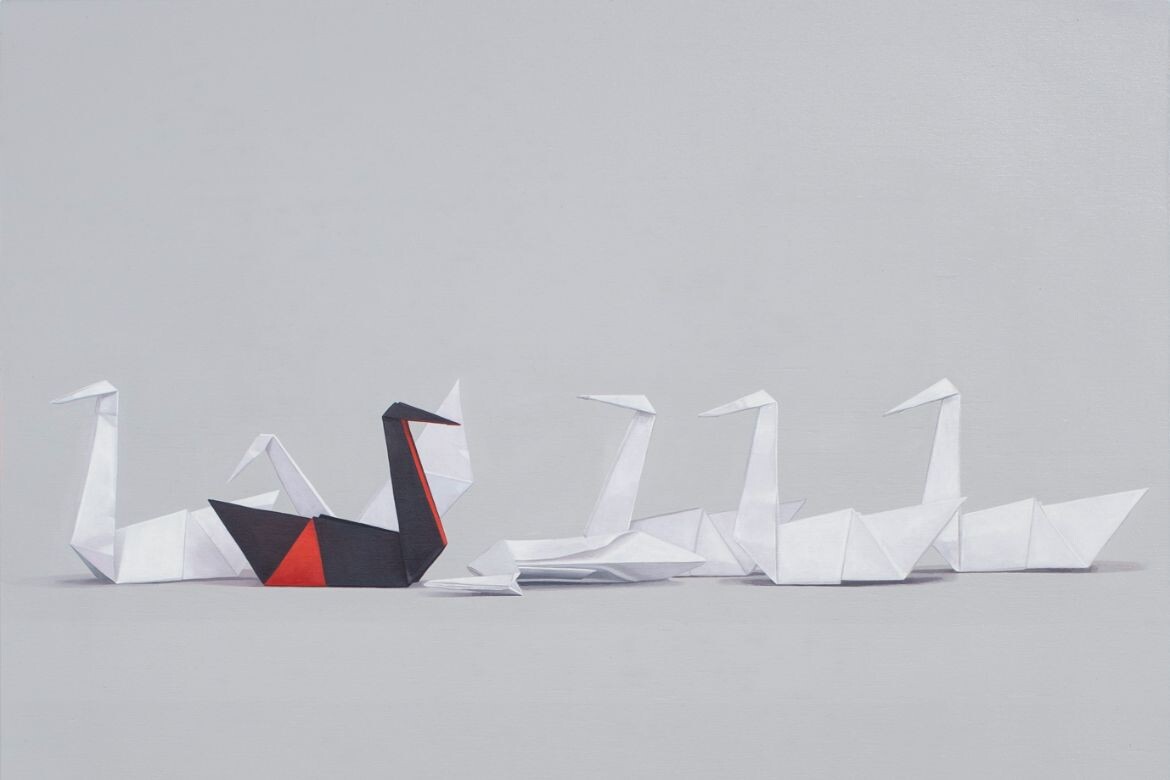Expanding a central theme of reassessing value, Dalton’s premise: “The idea of things that we had that were once important, but through the act of losing them, they become important” is picked up in the metaphor of swans. More specifically black swans, which for Europe was akin to the unicorn. That is, until Australia was spotted and the reality of black swans dawned. For the artist then, the Black Swan is the cataclysmic moment of change from which the way we see the world is forever altered.
The title piece of the exhibition, The Black Swan and Other Lost Poems, depicts a burned Penguin Classic semi-submerged in a fish bowl. Credited to Marcel Proust, the book is entirely of Dalton’s imaginings and speaks directly to his young experience of reading (though he says reading is perhaps too strong a word) of Proust’s In Search of Lost Time: “I figured that Marcel Proust has a last book of poetry. And when you consider the entirety of In Search of Lost Time, it would almost certainly have been called The Black Swan. And then I thought, oh, there’ll be other lost poems as well,” says Dalton, who being no slouch with metaphors has layered the fascism, oppression and control of burning books with the damage of goodwill.
Dalton clearly is neither glib nor drawn to cliché. Instead, the moments of change are strange and literary and undefinably unique to his sense of the uncanny. A fish swimming in a bowl that also contains a can of Fish Soup, for example, makes for a cringingly funny tableau with a surface allusion to Warhol.
Dalton’s fish, however, is oblivious to Warhol, the can or its contents: “Fish don’t care. Putting them into the fishbowl just removes the objects entirely from their natural function. Then, by necessity, they have to become symbols or metaphors. And ultimately when we’re all gone, and all that’s left behind is what we made. And, the fish won’t care,” says Dalton.

Talking To (A) God On The Big Red Telephone is another that speaks of change and the inherent and insidious loss that comes as technology encroaches: “It’s a very difficult thing to get your head around how attached we all were to a telephone ring. And how that was a shared event. The telephone’s ringing that everybody has: “I’ll get it” and you will run to get this telephone, it’s really the Pavlovian response and that lovely connection that you had, through this device that lived in your house,” says Dalton.
Disco takes this idea in another direction with information repeated and refracted to such an extent that it is rendered illegible and speaks to the loss of a coherent authentic voice as media while constant is without content.
“There’s a single light source shining on a disco ball and that completely destroys the information and makes it into this multifaceted, pretty flashing thing. You can’t see the information that’s gone into the cabal and that level of distraction and beautification just seems such a neat encapsulation of the way that we live our lives at the moment, everything is so pretty and flashing, but actually understanding that complexity becomes impossible.”

And then there is The Dissolution of Parliament. A birdcage busted from the inside with a few black feathers, and while the metaphors are abundant, it is the feeling of loss that Dalton most succinctly conveys. “Politics has become, in so many places, so populist, like it’s trying to become entertainment rather than politics and governance. All that’s left behind, is everyone trying to make these big, black swan moments that shape our lives, rather than what governance should be,” says Dalton.
There is a brilliance to Dalton’s work that gives the scope of his ideas the gravitas needed to allow the metaphors. There is also clearly an abundance of literary and social cognition for this extraordinary artist to draw on. “I’m just limbering up and stretching and knowing what proper ideas are in there. And, I feel like it’s improving as it goes along, which is a good feeling. It means I’ve got somewhere to go.”

Jonathan Dalton
instagram.com/jonathandaltonart
We think you might like this story about artist Artek Halpern-Laurence.

